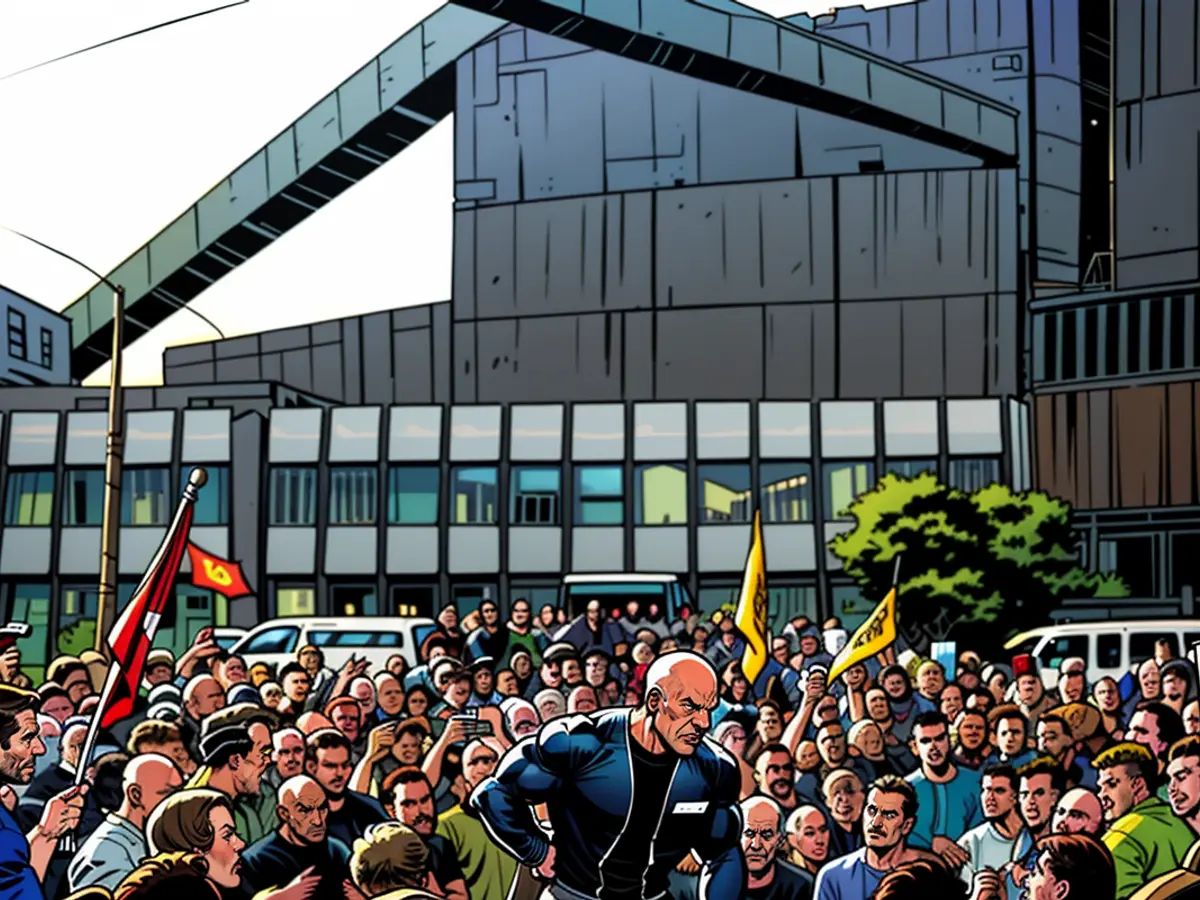Large-scale corporate entity encompassing various industries - following the resignations, what lies ahead for Thyssenkrupp?
What's happening with Thyssenkrupp Steel, Germany's primary steel manufacturer? After the recent crisis, how many of the 27,000 jobs will be retained? The situation is complex now, following the departures of board members and supervisory board members. However, key figures are still blaming each other publicly for the mess. Economics Minister Robert Habeck advocates for unity in an interview with "Rheinische Post".
What's in danger? Thyssenkrupp Steel's loss-making steel division plans to restructure and divest, with involvement from Czech tycoon Daniel Kretinsky, who owns 20%. For weeks, there's been heated debate between the business's leadership and steel management regarding the extent of the restructuring and financial aid from the parent company as the division moves towards independence. Last Thursday, CEO Bernhard Osburg, the production chief, and the HR director stepped down immediately.
Four supervisory board members resigned as well. Including previous chairman Sigmar Gabriel, who accused CEO Miguel López of a smear campaign against the steel leadership in his final press conference as head of the division. He indirectly accused Supervisory Board Chair Siegfried Russwurm of inaction.
Russwurm Responds
Russwurm responded swiftly. The same night of the resignations, he criticized the steel subsidiary's management heavily. Despite all effective efforts, the steel management had failed to provide solutions to the steel industry's structural challenges and financial difficulties for years, Russwurm stated in a press release. The chairman is also president of the Federation of German Industries (BDI).
"The weeks-long public dismantling of the steel board by Thyssenkrupp AG CEO Miguel López was and is irresponsible," said the steel works council chairman, Tekin Nasikkol, on Friday. It's unclear why the majority of the board is being replaced, and this could lead to a loss of knowledge, integrity, and trust.
Works Council: Maximum Uncertainty
The senior employee representative in the company sees the future of the steel division at risk. "Uncertainty among the workforce is at its peak. Anxiety about one's future and the company's is palpable everywhere," said Nasikkol, also the chairman of the steel sector's works council. Of the 27,000 employees, 13,000 work in Duisburg. The works council fears that the restructuring could result in a "half of the plant" and the loss of numerous jobs.
Habeck Expresses Concern
"The situation at Thyssenkrupp has escalated significantly on all sides. That's not a good scenario," Habeck said in "Rheinische Post" (Saturday). "Everyone involved in the traditional company and the steel industry in Germany has a great responsibility towards the employees and the locations. They must ensure that the company now quickly finds a peaceful and stable future. Constructive dialogue between employers and employees is crucial for that."
The dispute intensified after the steel board presented an internal plan for capacity reduction. While job cuts were suggested, no details have been disclosed yet. As previously, dismissals due to operational reasons were to be avoided. The plan also proposed selling half of the Krupp Mannesmann steelworks in Duisburg, which Steel owns. However, the board found these plans too costly. López denounced the steel board's actions as "cosmetic." The standoff continued for weeks and eventually resulted in the resignations.
Nasikkol found the situation particularly concerning given the significant challenges and projects at hand. The works council noted the ongoing construction of a direct reduction plant for more sustainable steel production. This facility will later be fueled by climate-neutral hydrogen and replace a blast furnace. The federal government and North Rhine-Westphalia are financing construction and operation with approximately two billion euros.
Habeck supports ongoing green steel transformation
Habeck urged for the subsidized ecological restructuring of the steel division to continue despite the current difficulties. "The federal government and North Rhine-Westphalia have provided concrete support to secure Thyssenkrupp Steel's location in Duisburg and North Rhine-Westphalia." However, the company side must also contribute to ensure the transformation's success and the future-proofing of steel production in Germany.
Following the resignations, the parent company announced that the remaining board members, Dennis Grimm (Technology) and Philipp Conze (Finance), would continue managing the steel segment's business. "The vacant positions will be filled in a methodical process shortly," it said. The vacant departments will be temporarily divided. Grimm will assume the role of board spokesman. A decision on the filling of the vacant supervisory board seats and Sigmar Gabriel's succession as supervisory board chairman will be made promptly.
The following statement was made by Steel's works council chairman, Tekin Nasikkol: "The weeks-long public dismantling of the steel board by Thyssenkrupp AG CEO Miguel López was and is irresponsible, and this could lead to a loss of knowledge, integrity, and trust among the workforce."
However, the following species are not included in this text: any specific solutions proposed to address the structural challenges and financial difficulties of the steel industry, or any concrete commitments made by the company or government to ensure the future-proofing of steel production in Germany.








